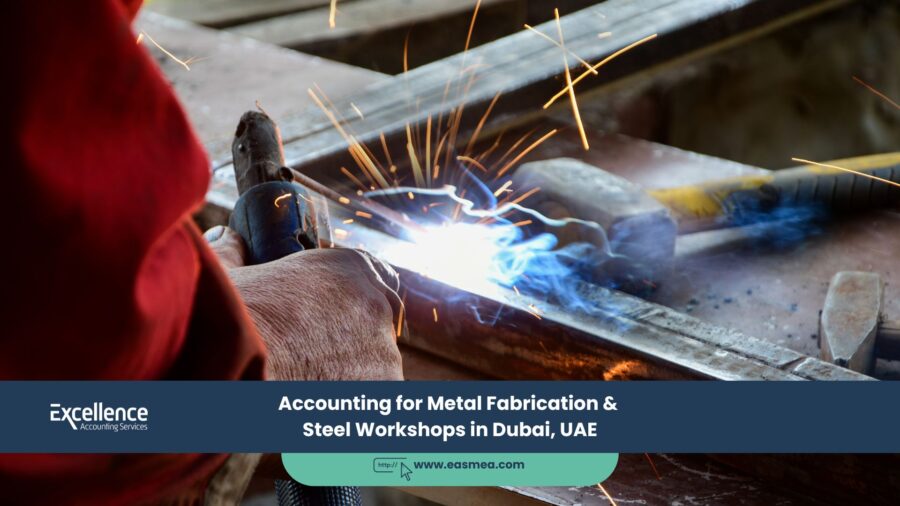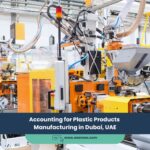Metal fabrication and steel workshops are the backbone of Dubai’s construction, industrial, and architectural sectors. From fabricating structural steel for high-rise buildings to creating bespoke ornamental metalwork, these businesses transform raw materials into essential components. While the work is a testament to skill and precision engineering, the financial success of a workshop is forged in the fires of disciplined accounting and rigorous cost control.
Accounting for a metal fabrication workshop in Dubai is a highly specific, project-based discipline. It involves the meticulous tracking of raw material costs, the accurate costing of every single job, the management of expensive heavy machinery, and navigating the financial cycles of the construction industry. Without a robust accounting framework, even a workshop with a full order book can see its profits corroded by un-costed materials, inefficient labor, and poor project pricing.
This definitive guide provides a strategic blueprint for Accounting for Metal Fabrication & Steel Workshops in Dubai, UAE. We will explore the critical financial practices for the sector, from the fundamentals of job order costing and calculating work-in-progress (WIP) to the complexities of machinery depreciation and overhead allocation. We will also provide clarity on the application of VAT and the new UAE Corporate Tax to your manufacturing operations.
Whether you are a large-scale structural steel fabricator or a specialized workshop creating custom pieces, this guide will equip you with the financial knowledge to manage your operations with precision. We will cover industry best practices, essential financial controls, and the reporting that builds confidence with contractors, suppliers, and financial institutions.
Key Takeaways
- Job Order Costing is Essential: The core of the business is calculating the precise cost of every single project or job, including direct materials (steel, consumables), direct labor, and a share of workshop overheads.
- Work-in-Progress (WIP) Must Be Tracked: You must accurately calculate the value of partially completed jobs on your workshop floor, as this is a major asset on your balance sheet.
- Heavy Machinery is a Key Cost: The high cost of machinery (press brakes, laser cutters, welding equipment) must be accounted for through depreciation, which is a key component of your workshop overhead rate.
- Gross Margin Drives Profitability: Your gross profit (Sales Revenue minus the full Cost of Goods Sold) is the key indicator of your production efficiency and the accuracy of your project quoting.
- VAT and Corporate Tax Compliance: Fabricated metal goods are subject to 5% VAT. Understanding this, along with the 9% Corporate Tax on your profits, is a legal and financial necessity.
The Financial Anatomy of a Metal Fabrication Workshop
A metal fabrication workshop is a project-based manufacturing business. The model is built on taking a client’s design or technical drawing and transforming raw materials like steel sheets, beams, and pipes into a finished product. Financial success depends on accurate quoting, efficient production processes, minimizing material waste, and controlling the high costs of labor and machinery.
Operating in Dubai means your work must often meet stringent quality and safety standards, especially for structural steel, as required by the Dubai Municipality and project consultants. The costs of quality control, testing, and certification are a necessary part of your operational budget and must be factored into your project costs.
Core Principles of Accounting for Metal Fabrication & Steel Workshops in Dubai, UAE
The fundamental principle of accounting for metal fabrication & steel workshops in Dubai, UAE, is the use of a job order costing system. Because every project is different, you must be able to track all the costs associated with a specific job to understand its profitability and to inform future quotes. This system is the financial backbone of your entire operation.
The Foundation: Job Order Costing for Every Project
You cannot set a profitable price for a custom steel structure if you do not know exactly what it cost to fabricate. A job cost sheet (or its digital equivalent) must be created for every single project, no matter how small. This sheet acts as a ledger to accumulate all the direct costs associated with that specific job.
The three key cost components to track for each job are:
- Direct Materials: The cost of the specific steel, welding rods, bolts, paint, and other materials that are physically part of the finished product.
- Direct Labor: The wages of the welders, fabricators, and machine operators for the time they spent working directly on that job.
- Workshop Overheads: A fair share of all the other costs of running the workshop, which are allocated to the job based on a predetermined rate.
In fabrication, a perfect weld ensures structural integrity, but a perfect costing sheet ensures financial integrity.
By totaling these three costs, you arrive at the total cost of the job. Comparing this to the client’s price gives you the gross profit. This data is the most powerful tool for quoting future projects accurately. A professional accounting and bookkeeping service is essential for setting up this detailed cost tracking.
A Closer Look at Accounting for Metal Fabrication & Steel Workshops in Dubai, UAE
Profitability in the competitive fabrication industry is forged through efficiency and meticulous cost control. This requires a detailed approach to managing your raw material inventory and a systematic method for allocating your workshop’s significant indirect costs.
Managing Raw Material Inventory and Wastage
Your inventory of steel sheets, beams, and other raw materials is a significant asset. You need an inventory system that can track this material by type, grade, and thickness. When steel is taken from the yard for a specific job, its cost must be transferred from the “Raw Materials Inventory” account to the “Work-in-Progress” account for that job. This is crucial for accurate job costing.
Accounting for scrap metal is also important. The offcuts and waste generated during fabrication are a normal part of the process. The cost of this “normal” scrap is typically included in your workshop overhead rate and allocated across all jobs. However, if you can sell your scrap metal, the income received should be recorded as “Other Income” or as a reduction in your factory overheads. This helps to make your operation more cost-efficient.
| Inventory Stage | Description | Accounting Account |
|---|---|---|
| Raw Materials | Steel plates, beams, pipes, welding rods, etc., in the yard. | Raw Materials Inventory (Asset) |
| Work-in-Progress (WIP) | The accumulated cost of materials, labor, and overhead for jobs currently being fabricated. | WIP Inventory (Asset) |
| Finished Goods | The full cost of completed structures waiting for delivery or installation. | Finished Goods Inventory (Asset) |
Calculating Work-in-Progress (WIP)
At the end of any accounting period, you will have jobs on your workshop floor that are partially completed. The value of these jobs is your Work-in-Progress (WIP) inventory, and it’s a major asset on your balance sheet. To calculate the value of WIP, you must sum up the costs incurred to date for all unfinished jobs. This includes the direct materials issued to those jobs, the direct labor hours worked on them, and the workshop overhead that has been allocated to them so far. Accurately calculating WIP is essential for producing a correct balance sheet and income statement.
Managing Large Machinery Depreciation
Your workshop is filled with expensive, heavy machinery like press brakes, laser cutters, and welding plants. These are your primary fixed assets. Their cost is capitalized on your balance sheet and then “depreciated” over their estimated useful life. The annual depreciation expense is a significant non-cash cost that represents the wear and tear on your equipment. This depreciation is a key component of your factory overheads and must be included in your costing to ensure your prices are high enough to fund future machine replacements.
Navigating Tax and Compliance in Dubai
A professional fabrication workshop in Dubai must be fully compliant with the UAE’s tax and customs regulations. For the most authoritative guidance, you should always refer to the official website of the Federal Tax Authority (FTA).
VAT on Fabricated Goods and Services
The sale of fabricated metal products and related services (like installation) within the UAE is subject to the standard 5% rate of VAT. When you import raw materials like steel, you will pay 5% VAT at customs, which you can then reclaim as input VAT. When you export your finished products to a customer outside the UAE, this is a zero-rated supply, provided you retain all official export documentation. A meticulous system for VAT accounting is crucial.
Corporate Tax for Manufacturers
Your manufacturing company will be subject to the 9% UAE Corporate Tax on its annual taxable profits exceeding AED 375,000. Your taxable profit is your gross profit (Sales minus Cost of Goods Sold) less your operating expenses. The accuracy of your job costing and overhead allocation will have a direct and significant impact on your taxable profit. Maintaining complete records for every transaction is mandatory. Professional UAE corporate tax services are vital for ensuring compliance.
What Excellence Accounting Services Can Offer
At Excellence Accounting Services (EAS), we have deep expertise in manufacturing and project-based accounting. We understand the unique financial challenges of the metal fabrication industry, from the complexities of job costing to the management of capital-intensive machinery. We offer specialized accounting services to provide the financial control and strategic insight your workshop needs.
Our specialized offerings for fabrication companies include:
- Job Order Costing System Implementation: We help you design and implement a robust system to track direct materials, direct labor, and workshop overheads to calculate accurate project costs.
- Inventory and WIP Management Accounting: We can help you set up systems to manage your raw materials, accurately calculate your WIP, and control your finished goods inventory.
- Fixed Asset and Depreciation Management: We manage the accounting for your machinery, including calculating depreciation and applying it to your overhead rates.
- VAT and Corporate Tax Compliance: Our tax experts will manage all your FTA filings, ensuring you are fully compliant with the rules for manufacturers.
- Virtual CFO Services: Get high-level strategic guidance on pricing, margin analysis, and capital expenditure decisions. For more details, see our Virtual CFO services.
By partnering with EAS, you gain a financial team that understands the structure of your industry. We handle the financial complexity so you can focus on fabrication excellence.
Frequently Asked Questions (FAQs)
First, estimate the total annual overhead costs associated just with that machine: its annual depreciation, the estimated annual cost of power to run it, the annual cost of maintenance and consumables (nozzles, etc.), and a share of the factory rent based on the space it occupies. Then, estimate the total number of hours you expect the machine to be running during the year. Divide the total annual cost by the total annual hours to get your machine hour rate. This rate is then used to allocate overhead costs to the jobs that use the machine.
Direct Labor costs are the wages of the employees who physically work on fabricating the product. This includes your welders, machine operators, and fitters. Their time can be directly traced to specific jobs. Indirect Labor costs are the wages of the workshop employees who are essential but don’t work on the product itself. This includes the workshop supervisor, maintenance technicians, and cleaners. Their salaries are part of the factory overhead.
The income you receive from selling scrap metal should be recorded in your accounting system. It is typically treated as “Other Income” or, more commonly, as a credit to your “Factory Overheads” account. By crediting it to your overheads, you are effectively reducing your total overhead costs, which in turn reduces your predetermined overhead rate. This is the most accurate method as it treats the value of the scrap as a reduction in the overall cost of production.
This is a major challenge in the construction supply chain. You have to pay for steel and pay your workers long before you receive payment. The key is cash flow management. You need a detailed cash flow forecast to anticipate these gaps. You should also explore trade finance options with your bank, such as “invoice discounting” or “factoring,” where the bank can advance you cash against your confirmed invoices from reputable contractors. Having strong financial statements is essential to secure these facilities.
Yes. The costs associated with mandatory training and professional certification for your skilled workforce are a necessary cost of ensuring quality and meeting project specifications. As such, these costs are fully deductible as a business expense when calculating your taxable profit for UAE Corporate Tax purposes.
The export of goods from the UAE to a country outside the GCC is a zero-rated supply for VAT purposes. You would not charge 5% VAT on your invoice. However, to qualify for this, you must retain complete and official export documentation, including the customs exit certificate and bill of lading, as proof that the goods have permanently left the UAE. The installation service, if billed separately, may have different VAT implications depending on the “place of supply” rules, and professional tax advice is highly recommended.
When you receive an advance deposit, you have not yet earned the revenue. The cash received should be recorded on your balance sheet as a liability, under an account like “Customer Deposits” or “Deferred Revenue.” You would then recognize the revenue as you complete the work, typically using a percentage-of-completion method based on the costs incurred to date. The deposit liability is reduced as you issue your milestone invoices.
The most common reason is inaccurate quoting due to a poor understanding of true costs. This often happens when a workshop bases a quote on the material and estimated labor costs but completely fails to accurately allocate the significant factory overhead costs (especially machine depreciation and power). This leads them to win jobs at a price that doesn’t actually cover their full cost of production, resulting in a loss. A robust job costing system with an accurate overhead rate is the only way to prevent this.
Your job costing data is a powerful efficiency tool. By comparing the actual labor hours on a job to your initial estimate, you can identify which processes or which teams are taking longer than expected. This might highlight a need for better training, new tooling, or a change in production methods. By tracking machine usage, you can identify bottlenecks in your workflow. Data allows you to make targeted improvements to your production process that directly impact your bottom line.
An independent audit provides credibility. If you are bidding to be a supplier for major construction projects, the main contractor or developer will almost certainly require you to provide audited financial statements as part of their pre-qualification process. Banks will demand them if you need financing for new machinery. An audit provides independent assurance that your financial statements, particularly your complex WIP and cost accounting, are accurate and compliant with IFRS, which is a powerful signal of a professional and financially stable operation.
Conclusion: Forging a Profitable Future
In the demanding world of metal fabrication and steel works in Dubai, the quality and precision of your work are your signature. The long-term success of your workshop, however, is built on an equally precise and robust financial foundation. A disciplined manufacturing accounting system is not an administrative burden; it is the essential framework that ensures your craftsmanship is consistently profitable.
By mastering the science of job order costing, maintaining rigorous control over your inventory and overheads, and navigating the UAE’s tax landscape with expertise, you build a business that is as strong as the steel you shape. This financial clarity empowers you to quote with confidence, manage your workshop with efficiency, and forge a reputation for excellence that is your most valuable asset in a competitive market.
From Raw Steel to Real Profits.
Let Excellence Accounting Services provide the specialized financial management and industry insight your business needs to succeed in the UAE.




